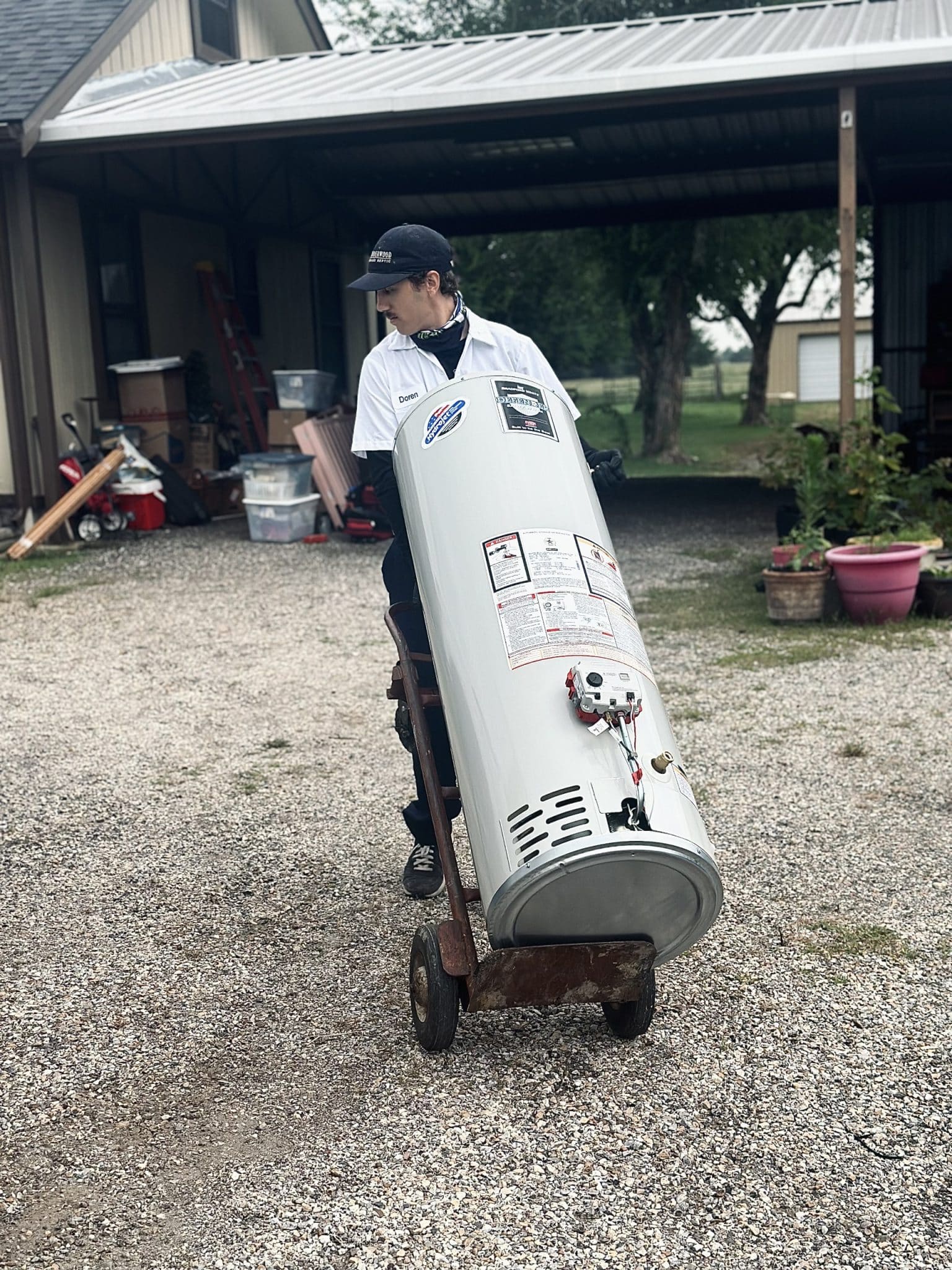Are your water bills skyrocketing lately? Or, are you constantly running out of hot water? If you’re a homeowner in Bonham, TX, and you relate, it might be time to think about a new water heater.
But the choice of what kind of water heater to get isn’t as simple as it once was. One question we hear a lot at Underwood Plumbing & Septic is: “Should I go tankless or stick with a regular water heater?”
The answer depends on your home, water usage, and budget. But understanding how each system works can make your decision a whole lot easier. Today, we’ll discuss tankless vs. traditional water heaters, how they’re different, and which one might be best for your home.
How Regular Water Heaters Work
Traditional water heaters have been around for decades. These systems heat and store a large amount of water—usually between 30 and 80 gallons—in a tank. When you turn on the hot water, it comes straight from that tank.
Why Homeowners Still Choose Them
- Lower upfront cost: These systems are generally less expensive to install.
- Easy to maintain: The technology is simple and well-known.
- Works well for big families: A big tank means a good amount of hot water, especially if you’re doing back-to-back showers or running multiple appliances.
Where They Fall Short
- Higher energy use: The water stays hot all day, whether you’re using it or not.
- You can run out: Once the hot water is gone, you’ll have to wait for the tank to refill and reheat.
- Shorter lifespan: These units usually last around 10 to 12 years.
Pros and Cons Of Tankless Water Heaters
Tankless water heaters heat water only when you need it. Instead of storing hot water, they use gas or electricity to heat it as it flows through the unit.
What Makes Them Appealing
- Energy savings: Because they only run when needed, tankless systems use less energy—especially in smaller households.
- Endless hot water: You won’t run out, even during long showers or laundry marathons.
- Takes up less space: The unit mounts on a wall and doesn’t need a bulky tank.
- Lasts longer: With regular maintenance, tankless systems often last 15 to 20 years.
Things to Keep in Mind
- More expensive to install: You may need upgrades to your gas line or electrical panel.
- Flow rate limits: If too many appliances or people need hot water at once, the unit might struggle—unless you’ve sized it right.
- Installation matters: Tankless systems need proper setup to perform well, so it’s important to have an experienced plumber install them.
Quick Comparison: Tankless vs. Traditional
| Feature | Traditional Water Heater | Tankless Water Heater |
| Upfront Cost | Lower | Higher |
| Energy Efficiency | Lower | Higher |
| Hot Water Supply | Limited | Endless (with right flow rate) |
| Space Needed | More | Less |
| Lifespan | 10–12 years | 15–20 years |
| Maintenance Level | Moderate | Moderate to High |
| Best For | Bigger families | Smaller homes or energy-conscious households |
Choosing the Best Water Heater for Texas Homes
In Bonham and the surrounding areas of Fannin County, we see a mix of both systems depending on the size of the home and the family’s needs. Texas weather is another factor. Since our winters are generally mild, tankless heaters perform well here. They don’t have to work as hard to warm up incoming water, which helps with energy efficiency.
That said, occasional cold snaps—like the 2021 freeze—can affect any water heater. That’s why proper insulation and installation are so important.
Ideal Water Heater for Small Homes or Couples
If you live in a smaller home or it’s just one or two people using hot water, a tankless water heater makes a lot of sense. You’ll save on energy bills and never worry about running out of hot water.
Ideal Water Heater for Bigger Families
Traditional systems might be a better choice if you have kids, guests, or a high demand for hot water at once. Unless you want to install a large-capacity tankless unit or use more than one, a tank might be simpler and more cost-effective.
Choosing the Most Energy-Efficient Water Heater
Saving money on energy is a big reason why many Texas homeowners are going tankless. According to the U.S. Department of Energy:
- If your household uses less than 41 gallons of hot water per day, you could save 24% to 34% with a tankless unit.
- Even if your use is higher, you can still save 8% to 14% compared to a traditional system.
And since tankless units tend to last longer, you could save even more over time—even if the installation costs a bit more at first.
Signs You Might Need a New Water Heater
Not sure your current unit is still doing its job? Here are some red flags to watch for:
- Rusty or discolored water
- Inconsistent water temperature
- Banging or rumbling sounds from the tank
- Leaks or puddles around the unit
- Hot water runs out too fast
- Your unit is more than 10 years old
If any of these sound familiar, it’s a good idea to get a professional to take a look.
Why Professional Installation Matters
It doesn’t matter if you go tank or tankless—getting it installed right makes all the difference. A licensed plumber will:
- Help you choose the right size for your home
- Make sure everything meets Texas plumbing codes
- Set it up for safe and efficient operation
- Insulate pipes and the unit properly (especially important for those rare winter freezes)
If you’re in Bonham, TX, or nearby, we can help. At Underwood Plumbing & Septic, our team has years of experience installing both tank and tankless water heaters across Fannin County.
Choose Underwood Plumbing & Septic for Expert Water Heater Installation In Bonham, TX
If you’re thinking about upgrading your water heater, our team is here to make the process simple and stress-free. We’ll walk you through your options, explain what makes sense for your home, and install everything the right way.
Serving Bonham, TX, and nearby communities, Underwood Plumbing & Septic is your go-to team for water heater replacements and new installations.
Give us a call today to schedule your water heater consultation. Let’s make sure you’ve got reliable hot water, all year long.

